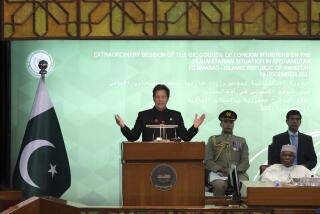Bush, Bhutto Agree to Seek Afghan Peace : Pakistani Leader, in U.S., Denies Rebel Military Victory Is Goal
WASHINGTON — President Bush, after meeting in private for nearly an hour with Pakistani Prime Minister Benazir Bhutto, pledged Tuesday that the United States will “explore any serious avenue” to a political solution to the bloody military stalemate in war-torn Afghanistan.
In a separate statement during an official White House ceremony after their meeting, Bhutto stressed that her nation also “remains committed to a political solution of the Afghan problem,” principally because “Pakistan’s commitment to peace and democracy are fundamental.”
The statements of the two leaders came after several months of military failures by the Afghan resistance, which has been financed and armed by the United States and Pakistan. The issue highlighted a day of intensive meetings between Bhutto and several U.S. Cabinet officials on subjects ranging from nuclear bombs and F-16 jet fighters to heroin and trade tariffs.
Senior Pakistani officials said Bhutto, who is increasingly dubious about the Afghan rebels’ ability to win the war militarily, went into the meetings with several specific proposals for a possible political settlement. The conflict has claimed more than 1 million lives and left more than 3 million Afghans in refugee camps in neighboring Pakistan.
Pakistani and U.S. officials refused to comment on the specific options, but Bhutto expressed her nation’s strong concern about the situation after the White House session.
Although the withdrawal of Soviet troops from Afghanistan in February has brought a “welcome change” in the country, she said, “the continued fighting and prolonged presence of over 3.5 million Afghan refugees pose serious threats to the peace and stability of the region.”
In an interview with The Times before leaving on her five-day U.S. visit, which ends Saturday, Bhutto said she would focus her efforts here on trying “to dispel the notion” that Pakistan wants the rebels to achieve a military victory over the Afghan government forces.
Army General Transferred
Earlier, Bhutto transferred the chief of her military intelligence service, an army general who was widely seen as a hawk in the conflict.
“The Afghan policy is constantly under review because, for Pakistan, it is an issue that impinges very deeply,” Bhutto said in the interview.
There was no hint Tuesday, though, that the continuing arms shipments to the rebels will cease, and senior officials from both countries said Tuesday night that it is essential to maintain military presure on the Afghan regime while they formulate a political settlement. A CIA-financed arms pipeline has funneled $2 billion in weapons to the rebels since the Soviets invaded Afghanistan in 1979 to support the Kabul government.
One senior Bush Administration official told reporters that there had been no significant shift in the two countries’ Afghan policy, stressing that Bush continues to call the current Soviet-backed government of Afghan President Najibullah an “illegitimate regime.”
In another key area of bilateral concern, though, Bhutto did get a concrete commitment: Pakistan’s renewed campaign to curb heroin production in a nation that now supplies about half the heroin sold on the streets of America.
The State Department pledged $1.5 million in new aid to help finance a $2.5-million Pakistani strike force that would be trained to go after what one Pakistani narcotics official estimates to be 500 illegal drug syndicates and 150 laboratories operating in autonomous tribal areas along the border with Afghanistan.
The Pakistanis had requested a total of $8 million in new U.S. aid for the strike force, but one narcotics official said “at least this is a start.”
Both the prime minister and Bush stressed in their official statements that the heroin issue, which Bush called “a scourge,” figured prominently in their talks. They added that other key issues discussed included Pakistan’s request to purchase 60 sophisticated F-16 fighter jets to add to its current fleet of 40--a proposal that most analysts said will be approved--and Pakistan’s controversial nuclear program, which several key U.S. officials believe is aimed at developing a nuclear weapon.
After a luncheon meeting with Secretary of State James A. Baker III, Bhutto reiterated her often-repeated line that Pakistan’s nuclear program is strictly peaceful. Bush said after their meeting that Bhutto “assured me that Pakistan’s nuclear program is committed to peaceful purposes.”
If the President fails to certify to Congress that Pakistan does not possess a nuclear device, the $621 million in military and economic aid that the Administration is requesting for Pakistan next year will be lost.
Bush added: “I underlined my Administration’s commitment to discourage proliferation of nuclear and chemical weapons, ballistic missiles, in the South Asia region and around the world.”
Although substantive policy issues were discussed in the sessions, the official statements by both leaders were dominated by expressions of lavish praise and mutual appreciation.
Several Pakistani and U.S. analysts said the rhetoric was meant to demonstrate that the United States is committed to the democratic government of Bhutto, who came to power in elections last year, at a time when her opposition at home remains fierce.
More to Read
Sign up for Essential California
The most important California stories and recommendations in your inbox every morning.
You may occasionally receive promotional content from the Los Angeles Times.









